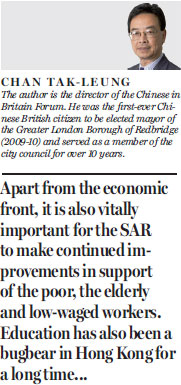Time to put 2016 behind us and look to the future
Updated: 2017-01-03 07:42
By Chan Tak-leung(HK Edition)
|
|||||||
Chan Tak-leung looks ahead at 2017 and offers some advice for the SAR, saying it should work hard to maintain its unique role as a window to the nation and to facilitate the Belt and Road Initiative
It is the time of the year when commentators reflect on what happened in the last 12 months - locally, regionally and globally. Some of them might look into their respective crystal balls and predict what may happen in the new year.
No doubt 2016 has been a turbulent year for many. In the United States, the presidential election result took a large number of pundits by surprise. What will happen to international relationships when US President-elect Donald Trump takes office in January is anybody's guess. In Europe, Britain's referendum in June which resulted in a slim majority for Brexit has certainly brought political chaos to the other 27 member states of the European Union. With a new prime minister and administration now focusing on what type of Brexit Britain would like, it remains a waiting game until Britain invokes Article 50 in 2017.

In the meantime, civil wars, unrest, shootings, suicide bombings, assassinations, arson and massacres have resulted in many deaths and injuries around the world in 2016 - not to mention natural disasters such as earthquakes, floods, droughts, tropical cyclones, heat waves, hurricanes, tornadoes, typhoons and wildfires. These caused havoc to people all over the world. And what about the many people killed, displaced and drowned due to political turmoil? The list could go on and on.
Comparatively speaking, in spite of the sporadic, childish, yet poisonous and politically motivated activities that infiltrated Hong Kong's news and social media throughout the year, 2016 for the HKSAR will probably be remembered by most as a year of resilience and sustainability against the backdrop of global uncertainties and disturbances.
Reflecting on what happened in the SAR over the last 12 months, a new legislature was elected. It was followed by controversial oath-taking antics by pro-independence legislators-elect and their subsequent disqualification, interpretation of the Basic Law by the Standing Committee of the National People's Congress, and the Chief Executive's decision not to seek re-election. There was also a riot at the beginning of the year. These were all stressful events, and yet the SAR has maintained its status as a global financial center - ranked No 3 for accessibility and No 5 for its economy. With a per-capita GDP of $42,407, Hong Kong is on a par with Britain at $43,890, demonstrating the SAR has continued to punch above its weight. Hong Kong is doing much better than similar economies in other parts of Asia.
After the Shanghai-Hong Kong stock trading link began operating in 2014, the Hong Kong-Shenzhen Stock Connect was launched in December 2016, facilitating further trading opportunities in the Southeast Asian market. In the last 12 months the SAR has developed as a technology hub; it is also being recognized for its significant geological heritage by UNESCO.
One must remember that all these successes were achieved despite persistent political gesturing in and out of Hong Kong's legislature, ill-informed and negative reporting by those with political motives who continued to misinterpret the "One Country, Two Systems" policy and the Basic Law, "localists" and various groups. They continued to promote their style of democracy by any means without taking into consideration the political and constitutional realities of the SAR as well as its geographical, cultural, heritage and economic links with the Chinese mainland.
Looking to the future, one would expect that with the excellent financial, technological and other service industries Hong Kong offers, the SAR should double its efforts in maintaining its unique role as a window to the nation, facilitating the Belt and Road Initiative. The Asian Infrastructure Investment Bank should capitalize on the expectation that China will continue to achieve an economic growth rate of 6.5 percent, according to Goldman Sachs' prediction, as a result of her infrastructure and consumption growth in 2017.
Apart from the economic front, it is also vitally important for the SAR to make continued improvements in support of the poor, the elderly and low-waged workers. Education has also been a bugbear in Hong Kong for a long time, and it would be useful to have an improved curriculum in areas that will help the SAR's youth have a better understanding of the past in order to prepare for the future.
Action to ensure the SAR will continue to exercise its high degree of autonomy and other powers safeguarding the rights and freedoms of its residents while ensuring the rule of law is applied in all situations are crucial to building confidence among key investment and trading partners.
Last but not least, may the candidate with Hong Kong's best interests at heart win the Chief Executive election in March.
(HK Edition 01/03/2017 page7)